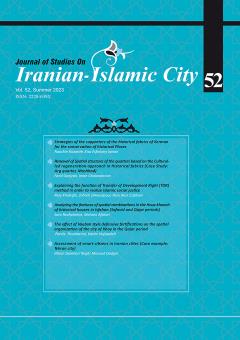Assessment of smart citizens in Iranian cities (Case example: Tehran city)
Subject Areas : Islamic urbanism
Elham Zabetian Targhi
1
![]() ,
masoud dadgar
2
,
masoud dadgar
2
![]()
1 - Researcher at BHRC (Building Housing Research Centre in Ministry of Road & Urban Development), Tehran, Iran.
2 - Member of the Faculty of Architectural Engineering, Faculty of Art and Architecture, University of Science and Culture, Tehran, Iran.
Keywords: smart city, smart citizen, education of smart citizens, Assessment.,
Abstract :
Based on the theoretical framework of the smart city, the third generation of smart cities in the world emphasizes "smart citizens" rather than supporting infrastructure; In fact, the smartness of cities depends on the smartness of citizens rather than the development of new technologies and infrastructures. Also, there are internationally approved indexes for measuring and evaluating the state of intelligence of citizens, which of course can be revised based on the cultural and contextual conditions of each region in cities. Therefore, according to the importance of the subject and to extract and diagnose the intelligence indexes of citizens in Iran, in this research, after document, with the conceptualization method, the indexes and sub-indexes of citizen evaluation have been extracted and then in the stage of survey studies, electronic questionnaires have been designed to measure the mentioned indexes and distributed among about 270 citizens of Tehran (as the capital and the leader in the field of intelligence in the country). In the next stage, quantitative and qualitative analyses have been carried out. By using multivariate regression and beta test, related indicators have been ranked and interpreted. Finally, the results show that the participation index is the most important element in the field of smart citizens, and this indicates that the promotion of the role of the citizens does not necessarily depend on the provision of infrastructure and the introduction of new technologies in cities. Also, suggestions for educating smart citizens from preschool to university level have been presented.
روحانی، پريسا و ديگران (1388) رابطه متقابل شهر الكترونيك و شهرداري الكترونيك، دومين كنفرانس بين¬المللی شهرداري الكترونيكی، وزارت كشور، تهران.
فلاح، مسعود، صارمی، حمیدرضا (1393) بررسی شاخص¬ها و معیارهای شهر هوشمند در توسعه شهری پایدار، کنفرانس ملی شهرسازی، مدیریت شهری و توسعه پایدار.
مدیریت آمار، فناوری و تحلیل اطلاعات (1393) سی و ششمین نشست هم¬اندیشی شهر هوشمند، شهرداری مشهد، معاونت برنامه¬ریزی و توسعه، شهریورماه.
Albino, V. Beradi, U. Dangelico, R.M. (2015) Smart Cities: Definitions, Dimensions, Performance, and Initiatives. Journal of Urban Technology. 22(1): 3-21.
Anastasia, S., (2012) The concept of smart cities: Towards community development? Networks and Communication Studies, NETCOM, vol 26: 375- 388 .
Backhouse, J. (2020, September) Selecting indicators for the Smart City Pilot in Knowledge Oasis Muscat (KOM), Sultanate of Oman. In Proceedings of the 13th International Conference on Theory and Practice of Electronic Governance (pp. 791-794).
Bosch, Peter, Jongeneel, Sophie, Rovers, Vera, Neumann, Airaksinen, Miimu, Huovila, Aapo (2017) CITYkeys indicators for smart city projects and smart cities, Co-funded by the European Commission within the H2020 Programme, Grant Agreement no: 646440.
Caragliu, A. (2002) Smart Cities in Europe. 3rd Central European Conference in Regional Science _ CERS. A13, L25, O10, R12.
Cohen B. (2012) THE SMART CITY WHEEL. 2012.5.14 https://www.smart-circle.org /smartcity/blog/boyd-cohen-the-smart-city-wheel/.
Cohen B. The 3 generations of smart citiesInside the development of the technology driven city. Fst Co Jo. 2015.
Giffinger, R, Fertner, C., Kramar, H., Kalasek, R., Pichler-Milanovic, N., Meijers, E. (2007) Smart cities – Ranking of European medium-sized cities. Smart Cities, Vienna, Centre of Regional Science, pp. 5-21.
Huovila, A., Bosch, P., Airaksinen, M. (2019) Comparative analysis of standardized indicators for Smart sustainable cities: What indicators and standards to use and when? Cities, 89(January), 141–153. https://doi.org/10.1016/j.cities.2019.01.029.
International Standards Organization (ISO), “ISO 37120:2014 - Sustainable development of communities -Indicators for city services and quality of life, ” 2014.#3 ISO/CD 37122 Sustainable Development in Communities-Indicators for Smart Cities.
Mosannenzadeh, F. Vettoratob. D. (2014) Defining smart city: Aconcepttual frame work based on key word analaysis. Journal of Land Use, Mobility and Environment. ISSN 1970-9889, e- ISSN 1970-9870.
N S N Wahab, T W Seow, I S M Radzuan and S Mohamed (2020) A Systematic Literature Review on The Dimensions of Smart Cities, Conference Series: Earth and Environmental Science, Volume 498, The 5th International Conference on Civil and Environmental Engineering for Sustainability 19-20 December 2019, Johor, Malaysia.
Zhang, Y., Liu, F., Gu, Z., Chen, Z., Shi, Y., & Li, A. (2019) Research on smart city evaluation based on hierarchy of needs. Procedia Computer Science, 162, 467-474.
ITU-T Technology Watch Report (2013) Smart Cities. Retrieved from www. Smart Cit.


